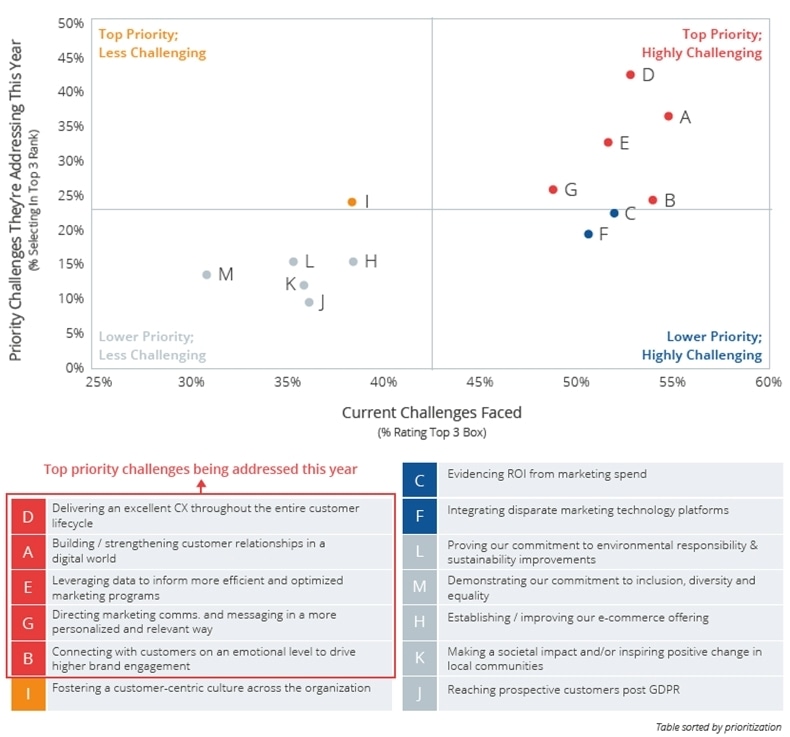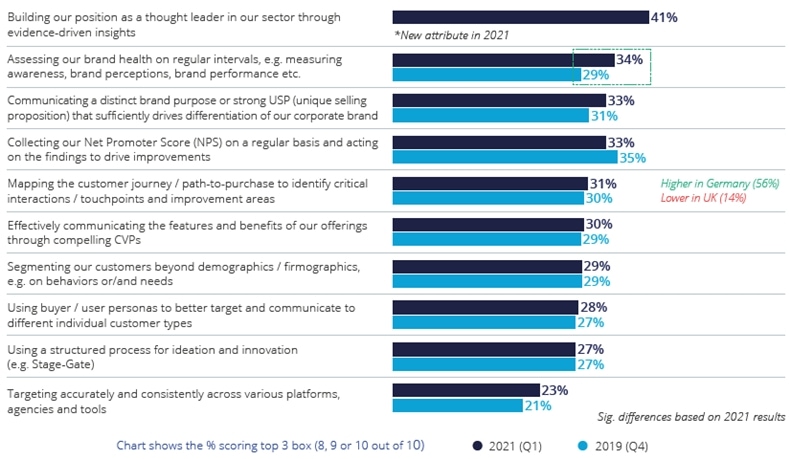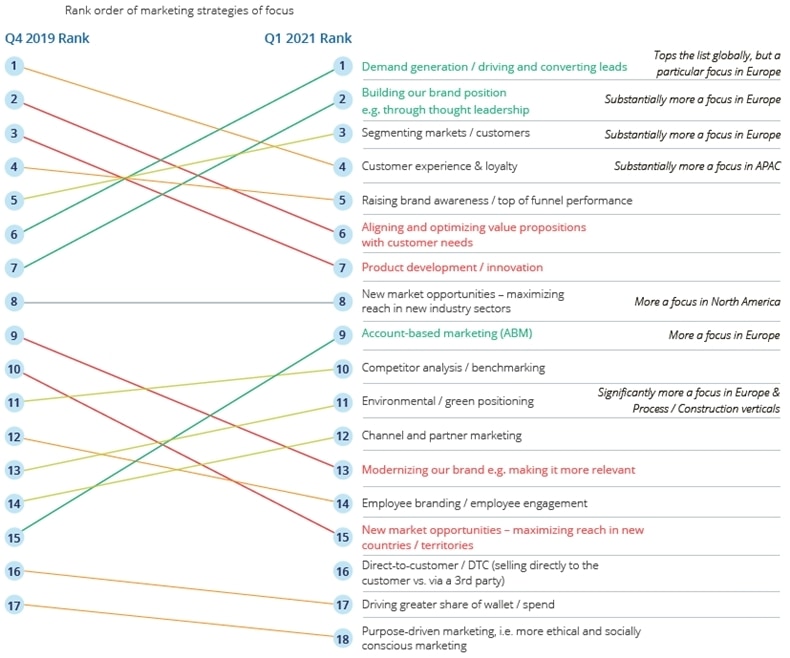Digital-first creates customer experience challenges for B2B enterprises, while demand gen and brand positioning become the top priorities, according to the B2B Marketing Monitor study conducted by B2B International.
B2B Marketing Pain Points and Priorities
Because of economic uncertainty and rapid acceleration of digital transformation, 2020 was a challenging year for most businesses.
Many B2B organizations—especially those in manufacturing and industrial sectors—had not yet developed strategic road maps for investing in the likes of marketing automation and e-commerce, yet they found themselves propelled into a digital-first ecosystem to keep up with fast-changing market dynamics.
The most widespread challenge of B2B enterprise marketers
Building/strengthening customer relationships in a digital world is cited by 55% of B2B enterprise marketers as a challenge.
The proportion of human-to-human touchpoints in the buyer journey has dropped dramatically as B2B buyers use more digital tools to stay informed, seek new suppliers, evaluate options, order products, and more. Not surprisingly, 54% of B2B brands struggle connecting with customers on an emotional level to drive higher brand engagement.
The pressure is on B2B enterprises to stay connected to their customers through a digital-first or solely digital channels, and to try to reach new customers through alternative means that might appear faceless and void of empathy.
The highest-priority challenge faced by of B2B brands
Delivering an excellent CX throughout the entire customer lifecycle is the most-cited Top 3 challenge facing B2B enterprise marketers. Of all challenges, CX—the third most common challenge cited (53% of respondents selected it)—is the top priority for B2B marketers to address this year (selected by 43% as a Top 3 priority challenge they're focusing on).
The more customer-centric organizations are those that understand how to win customers, how to keep customers, and how to convert customers into brand ambassadors. The brand advocates are those who spend more over time and spread positive word-of-mouth, driving increased demand.
Only 22% of B2B enterprises say the excel on the customer experience ("CX Leaders"), and this cohort is significantly more likely than its counterparts to measure customer lifetime value as a customer loyalty metric.
In other words, those who understand how to tailor the customer experience to different customer needs and behaviors throughout the customer lifecycle are more likely to deliver and capture greater value.

Highest-Performance B2B Marketing Practice Areas
Across 9 of the 10 marketing practice areas tested, only around one-fourth to one-third of B2B brands rate themselves well, indicating that overall B2B marketing performance is mediocre.
Despite the strain on marketing resources caused by the pandemic, performance has remained stable. No improvement was made to any of the marketing practice areas, apart from brand health tracking, where a small increase in the proportion of B2B marketing professionals rated their organization well compared with 2019.
Building a thought leader position is the highest-performing practice area: 41% rated their performance an 8, 9 or 10 out of 10. That's potentially because thought leadership positioning has become the top priority strategy for the year ahead, as marketing budgets have become digital-first and content-led.

High-Priority B2B Marketing Strategies
Although delivering an excellent customer experience throughout the entire customer lifecycle is the top marketing challenge being addressed, demand generation and building the brand position have overtaken CX & loyalty as the top marketing strategies of focus this year (particularly in Europe).
- The increased importance of demand gen, up from rank 6 in 2019 to rank 1 this year, suggests that B2B enterprises are more focused on quick wins.
- Similarly, building the brand position (such as through thought leadership) has jumped in importance from rank 7 in 2019 to rank 2 this year, highlighting the role of content in driving brand awareness and brand preference in the digital-first buyer journey.
- Customer experience & loyalty has dropped in importance from rank 1 to rank 4, possibly contributing toward the top challenges faced with customer experience management in a more digital world. The pandemic propelled many businesses into panic mode, pivoting priorities from customer-centric to brand-focused strategies.

B2B Enterprise Marketing Opportunities
The mediocre marketing performances across B2B enterprises, and the CX challenges holding them back, highlight three opportunities for B2B marketers to overtake their competitors:
- Embrace empathy in the digital-first ecosystem. The best-in-class B2B brands are those that deliver hyper-relevant, personalized experiences tailored to real people behind the digital touchpoints, in the right place at the right time, and—most important—with messaging that is authentic and empathetic vis-à-vis every human behind the interaction.
- Think beyond leads and loyalty to lifetime value. B2B customer experience leaders are those that segment their customers based on the relative importance to the business, such as the more profitable customer groups. This results in a greater ROI on marketing spend by focusing on maximizing value over minimizing costs.
In other words, by identifying how to deliver greater value to different customer groups, B2B brands can in turn capture more value, resulting in a win-win outcome.
- Shift from a product-first to customer-centric mindset. Many B2B brands fall into the trap of focusing on what they have to sell versus on the unmet customer needs they will meet. The impact of the pandemic exacerbated this inward-looking and short-term mentality as B2B organizations sought quick wins.
However, the most successful B2B brands are those that not only step outside their view of the world to see the customer's perspective but also put the customer's needs at the heart of everything they do.
For further insights from the B2B Marketing Monitor, download charts and infographics on B2B Marketing & Strategy Trends and B2B CX Excellence.
About the study: The B2B Marketing Monitor survey was run in Q1 of 2021 by B2B International, a leading specialist business-to-business market research agency, and part of Merkle B2B, owned by Dentsu. The sample size consisted of 301 marketing, insight, CX, and business strategy decision-makers across brands serving B2B audiences and focused on large businesses (the average revenue was $2.9 billion). The sample is international: 36% North America (predominantly US); 40% Europe (predominantly UK & Germany); 24% APAC (Singapore & Australia).




